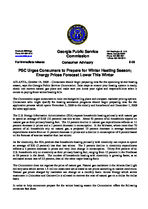Contact: Bill Edge Phone 404-656-2316 www.psc.state.ga.us
For immediate release
Georgia Public Service Commission
Consumer Advisory
244 Washington St. S.W. Atlanta, Georgia 30334 Phone: 404-656-4501 Toll free: 800-282-5813
5-09
PSC Urges Consumers to Prepare for Winter Heating Season; Energy Prices Forecast Lower This Winter
ATLANTA, October 14, 2009 Consumers should begin preparing now for the upcoming winter heating season, says the Georgia Public Service Commission. Take steps to ensure your heating system is ready, check into current natural gas plans and make sure you know your rights and responsibilities when it comes to paying those winter heating bills.
The Commission urges consumers to look into budget billing plans and compare marketer pricing options. Consumers who might qualify for heating assistance programs should begin preparing now for the application process which opens November 2, 2009 to the elderly and homebound and December 1, 2009 for other applicants.
The U.S. Energy Information Administration (EIA) expects households heating primarily with natural gas to spend an average of $105 (12 percent) less this winter. About 52 percent of all households depend on natural gas as their primary heating fuel. The 12 percent decline in natural gas expenditures reflects an 11 percent decrease in prices and a 1 percent decrease in consumption. In the Midwest, where more than 70 percent of all households rely on natural gas, a projected 15 percent decrease in average household expenditures results from an 11 percent decrease in prices and a decline in consumption of 4 percent based on the forecast of warmer weather than last winter.
As for electricity, the EIA predicts that households heating primarily with electricity can expect to spend an average of $20 (2 percent) less than last winter. The 2 percent decline in electricity expenditures reflects a 2 percent decrease in prices and very little change in consumption. Thirty-five percent of all U.S. households rely on electricity as their primary heating fuel, ranging from 13 percent in the Northeast to 59 percent in the South. The number of households heating with electricity is growing faster, at an estimated annual rate of 2.5 percent, than all the other major heating fuels.
The Commission does not regulate the price of natural gas. Natural gas marketers in the Atlanta Gas Light delivery area which serves 1.5 million customers are allowed to set prices according to market conditions. Natural gas prices charged by marketers can change on a monthly basis. Atmos Energy which serves customers in Columbus and Gainesville is allowed to recover the cost of natural gas on a dollar for dollar basis.
In order to help consumers prepare for the winter heating season the Commission offers the following consumer fact sheet.
CONSUMER FACT SHEET
Georgia consumers can take a number of steps to reduce the impact of winter heating costs. They include:
Budget Billing: Consumers who are on a budget, retired or on a fixed income may find budget billing to be an attractive payment option. It allows consumers to make levelized monthly payments on their bills, and is available whether consumers have fixed or variable rate plans. Budget billing can help consumers avoid the spikes in their winter heating bills.
Energy Conservation: Conservation is vital to any plan of action to lower one's monthly utility bill. Purchasing energy-efficient equipment such as a furnace, hot water heater and/or stove, caulking around doors and windows, insulating walls, floors and the attic, are some things consumers can do to lower their winter heating bills. Of course, if you don't need to have any of your equipment replaced, be sure to have these inspected by a professional to insure operation at maximum efficiency.
Weatherization: Weatherization assistance for low-income families is available in Georgia. This assistance is offered through a program administered by the Georgia Environmental Facilities Authority. For information on weatherization assistance go to: http://www.gefa.ga.gov/ or call 404-584-1000.
Low Income Assistance: Low income consumers may qualify for assistance with their heating bills through the Low-Income Home Energy Assistance Program (LIHEAP). It is administered by the Georgia Department of Human Resources who distribute this federal grant money through local community action agencies. Consumers may also be eligible for assistance through other programs sponsored by their local utilities or social service agencies. Information about LIHEAP is available at http://www.dhr.ga.gov/ or by calling 404-656-2323 or 1-800-869-1150.
It is also a good time to see if you're getting the best value for your dollar. The Commission publishes a monthly price-comparison chart of all natural gas marketers' plans fixed and variable. Check the price you pay your marketer with the price of other marketers to see whether it is in your best interest or not to change to another marketer. Also, the Regulated Provider is available to serve low-income citizens and those who are not able to obtain service from any of the certificated marketers in Atlanta Gas Light Company's service area.
For more assistance, visit our website, www.psc.state.ga.us, to get information to help you manage your utility bills, to assist in selecting a natural gas marketer, and to get additional conservation tips.
Consumers may contact the Commission for more information: Georgia Public Service Commission 244 Washington Street, SW Atlanta GA, 30334
Toll-free in Georgia (outside Metro Atlanta): (800) 282-5813 Metro Atlanta: (404) 656-4501 Fax :( 404) 656-2341 Email: gapsc@psc.state.ga.us
###
2
